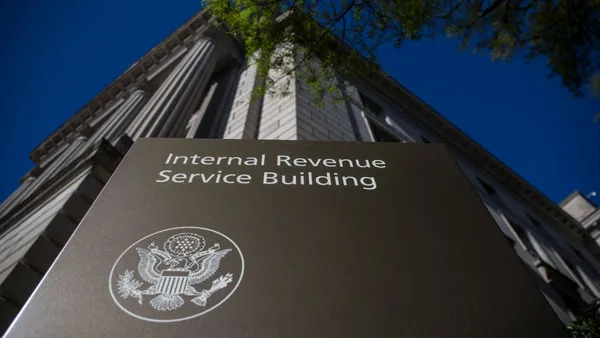Dive Brief:
- Environmental, social and governance (ESG) programs are gaining more attention among members of the C-Suite, with CFOs attempting to square the costs of such programs with the changing wants and expectations of their stakeholders, employees and consumers.
- When overhauling one’s ESG strategy, it’s critical for CFOs and other key leaders to examine “what you have already in your system,” said Donavan Hornsby, chief market strategy officer for ESG software solutions provider Benchmark ESG |Gensuite in an interview. Considering how existing ERP, HR or finance systems can be used to help collect and disseminate ESG data should be top of mind for organizations.
- “When you’re talking about ESG you’re talking about a lot of information,” he said. “The other key thing to note is that it’s cutting across a whole bunch of different functions — this is not just the purview of the sustainability group, or the supply chain or what have you.”
Dive Insight:
Tapping technologies such as the cloud in tandem with existing tools can allow for smoother, data-driven communication between these different functions, aiding companies as they craft their ESG strategies in response to changing company needs as well as regulatory guidance.
CFOs don’t necessarily need to become sustainability experts, therefore, Hornsby said, but they do need to be able to accurately quantify and share key data regarding it with other executive members.
“I don’t think that CFOs and other members of the C-Suite have to have this capability,” he said of sustainability expertise. “What they do need to have is the ability to communicate with others how sustainability performance is directly tied to the creation and protection of shareholder and stakeholder value.”
ESG — and especially climate-related disclosures — have also become top concerns for regulators as well as shareholders, with the Securities and Exchange Commission (SEC) seeking to tighten rules that would require mandatory climate change disclosure for companies within filings. Implementing ESG data management and reporting capabilities in compliance with these rules can help to “lay the foundation” for a more sustainable and resilient business, Hornsby argued in an opinion piece published with CFO Dive in May.
A June 2022 survey of 50 Fortune 100 companies by law firm White & Case found every firm surveyed had included environmental disclosures within their 2022 filings, with 37% of filings including historic metrics for information on greenhouse gas emission reductions and renewable energy use. U.K. and European regulators have also taken steps to increase environmental reporting guidance for companies, meaning firms now have to juggle multiple ESG standards and requirements to conduct international business.
“Probably the biggest concern our community has is the proliferation of this in the different jurisdictions and trying to identity the common thread across [them],” Hornsby said.
This means there is always going to be a “push” for global ESG standardization, but Hornsby is not optimistic about the chances of such standardization ever occurring. Companies should instead look to find that “common thread” between different jurisdictions and standards and “build [their] programs and processes across that common thread,” he said.
Creating the kind of holistic ESG strategy will take time, however. ESG is a “30-to-40-year transformation” for firms, a timeline that often comes with significant cost attached, Kristin Moyer, an analyst VP for Gartner, said at a June conference.
Corporate opinion about the benefits of such programs thus remains divided, especially as rising inflation causes many firms to review their spending in an attempt to cut costs and bolster profits. ESG investing typically bumps up production costs with a corresponding drop in output, something that can lead to an increase in inflation and divert money away from other key areas for companies, a July 5 opinion piece in The Wall Street Journal pointed out.
Both stakeholder, employee and consumer opinion has swung to value ESG — especially environmental strategies and data — much more highly in recent years, however. For example, HSBC executive Stuart Kirk recently resigned from his position at the U.K. bank after facing severe backlash for May comments where he criticized the financial sector’s commitment to reporting climate change risk, with HSBC CEO Noel Quinn stating Kirk’s comments were “inconsistent” with the bank’s strategy.
Employees, meanwhile, are also keeping ESG factors such as environmental strategies and social factors such as access to reproductive rights top of mind when they hunt for new opportunities, something that could turn sustainability strategies into a talent acquisition play for many firms. Thinking about one’s ESG strategies in the long-term is therefore critical for today’s companies, Hornsby said.
“If you want to be able to sustain high-performing ESG companies, it’s what you do in year two, it’s what you do in [years] three, four, five that’s going to matter,” Hornsby said.













